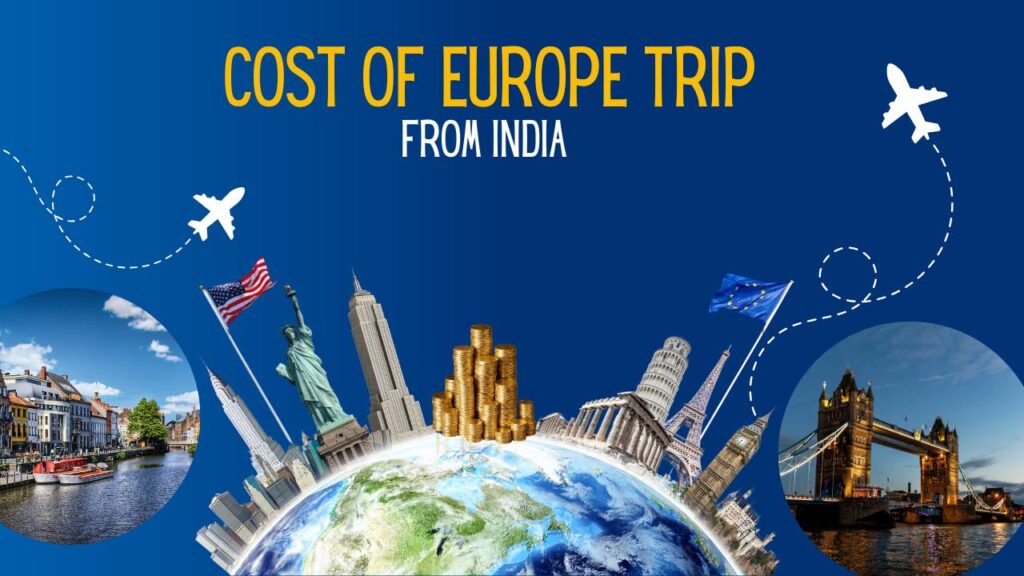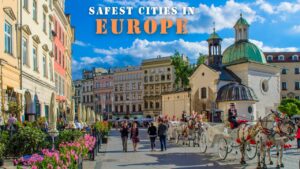A Europe trip is often considered the ultimate travel experience for Indian tourists—offering a mix of history, art, architecture, fashion, food, and natural beauty. But one of the biggest questions that arises before planning is: What is the actual cost of Europe trip from India? Many believe it’s too expensive, but with proper planning and understanding of all the elements involved—like flights, visa, hotels, food, and transport—you can make your dream European vacation a reality, even on a modest budget.
What to Pack for Europe Trip: Smart Essentials for Every Season!
Here’s a detailed and well-explained breakdown of all the costs, helping you plan smarter and save more while maximizing your experience.
International Flight Costs from India to Europe
Flights are generally the most expensive component when planning a trip to Europe from India, and costs can vary greatly based on your departure city, arrival destination, time of booking, and travel season. For travelers from major Indian metros like Delhi, Mumbai, Bangalore, or Chennai, round-trip flights to European cities such as Paris, Rome, Amsterdam, Frankfurt, Zurich, or Madrid are the most common routes.
A typical round-trip economy class ticket booked 2–4 months in advance will cost anywhere between ₹40,000 to ₹70,000 depending on the airline, transit duration, and season. Direct flights by airlines such as Air India, Lufthansa, and British Airways tend to be pricier but more convenient, whereas budget carriers like Etihad, Qatar Airways, Turkish Airlines, or Gulf Air offer cheaper fares with longer layovers.
During peak tourist seasons like summer (May–August) or Christmas-New Year, flight costs may rise by 20%–40%. Conversely, flying in the off-season (November to March) can significantly reduce your airfare. It’s also advisable to use fare comparison websites and set alerts to monitor price drops before making a booking. Flexibility in travel dates and opting for weekday departures can also bring down the overall cost.
Schengen Visa Costs and Application Process for Indian Citizens
To enter most European countries, Indian citizens must apply for a Schengen Visa, which allows travel across 27 member nations including France, Italy, Germany, Spain, Netherlands, Austria, and Switzerland. Understanding the cost and process of getting this visa is crucial as it’s a non-negotiable part of your trip.
The visa application fee for adults is around €90 (approximately ₹8,100), while for children aged 6 to 12 years, the fee is €45 (around ₹4,050). Children below six years are exempt from this fee. Apart from the consular fee, applicants also need to pay VFS or BLS service charges which range between ₹1,500 and ₹2,000, depending on the country of application. These centers help with biometric data collection and document verification.
In addition, travelers must purchase Schengen travel insurance with a minimum coverage of €30,000, which typically costs between ₹1,000 to ₹2,000 for a 15-day policy. Some applicants may also incur extra costs for photocopies, document translations, or cover letter writing services, especially if they’re using visa consultants.
Applicants must provide a detailed itinerary, confirmed return flight tickets, hotel reservations, a cover letter, bank statements, ITR proofs, and employment-related documents. The entire process from application to visa approval may take 15–25 working days, so applying at least a month in advance is highly recommended. Altogether, the total visa-related expenses per person average between ₹10,000 to ₹13,000.
Hotel and Accommodation Costs Across Europe
Accommodation in Europe comes in a wide variety of options—ranging from budget hostels and guesthouses to premium hotels and boutique apartments. The cost of accommodation depends on the country you are visiting, the season of travel, the type of stay, and the location within the city.
For budget travelers, hostels and shared dormitories are widely available in almost every European city and typically charge ₹1,500 to ₹2,500 per night. These are ideal for solo travelers or backpackers and often include basic breakfast, Wi-Fi, and shared kitchens. Many also offer lockers and luggage storage facilities.
Budget hotels and 2-star accommodations generally range between ₹3,000 to ₹5,000 per night for a double room. These are suitable for couples or families seeking privacy without luxury. If you prefer mid-range comfort with amenities like room service, air conditioning, and central locations, 3-star hotels or boutique hotels cost around ₹5,000 to ₹8,000 per night.
Luxury travelers looking for 4 or 5-star hotels, especially in cities like Zurich, Paris, London, or Vienna, may need to budget ₹10,000 or more per night, depending on facilities and location.
Alternatively, Airbnb apartments provide excellent value for money, especially for families and long-stay travelers. You can get entire apartments for ₹3,000 to ₹7,000 per night, which allows for self-cooking and home-like comfort. Always read reviews and check host credibility before booking.
Staying near public transport stations or city centers can reduce your intra-city travel time and costs significantly, even if you pay slightly more for the location.
Transportation Costs Within and Between European Countries
Europe is well known for its efficient, reliable, and interconnected public transport systems. Whether you’re traveling within cities or hopping from one country to another, transport is easy to navigate and offers options for every budget.
For inter-country travel, the Eurail Pass is a popular choice among tourists. The Eurail Global Pass offers unlimited train travel across 33 countries for a specific number of travel days, with prices ranging from ₹18,000 to ₹35,000, depending on the duration and number of days selected. This pass is extremely useful for travelers covering multiple destinations such as France, Switzerland, Italy, Germany, and Austria in a single trip.
Alternatively, budget airlines like Ryanair, Wizz Air, and EasyJet offer cheap flights within Europe with fares as low as ₹1,500 to ₹5,000, but often charge extra for check-in baggage and priority boarding. It’s a cost-effective option for long distances.
In cities, public transport is well-organized with metro systems, buses, and trams. A daily travel pass costs anywhere from ₹150 to ₹400 per day, depending on the city. Most cities offer multi-day or weekly passes, which are more economical and provide unlimited rides.
Taxis and Uber services are available in most cities but are significantly more expensive than public transport. A short ride may cost between ₹300 and ₹1,000. Walking and renting bicycles are also viable options in cities like Amsterdam, Berlin, and Copenhagen, offering a unique way to visit.
Food and Dining Costs for Indian Travelers
European cuisine offers a delightful variety, from pasta in Italy and crepes in France to sausages in Germany and tapas in Spain. Food expenses depend on where and how you choose to eat.
Budget travelers can survive comfortably on ₹800 to ₹1,500 per day by eating at local bakeries, fast food joints, supermarkets, and street food stalls. Items like sandwiches, kebabs, and pizzas are affordable and widely available.
Those preferring a mix of casual dining and occasional restaurant meals should budget ₹1,500 to ₹2,500 per day. A decent two-course meal at a mid-range restaurant generally costs around €15–€25 (₹1,500–₹2,200). Indian restaurants are also available in major cities like London, Paris, and Berlin, although they can be slightly more expensive due to imported ingredients.
For luxury dining or gourmet experiences, expect to pay ₹3,000 to ₹6,000 per person or more, especially in fine-dining establishments or Michelin-starred restaurants. Many high-end restaurants require reservations well in advance.
Buying groceries from local supermarkets and cooking your own meals in your Airbnb or hostel kitchen can dramatically reduce food expenses. A grocery budget of ₹400–₹600 per day per person can cover breakfast, snacks, and even dinner.
Sightseeing and Attraction Entry Fees
Europe is home to some of the most iconic landmarks in the world—from the Eiffel Tower in Paris to the Colosseum in Rome, and the Swiss Alps in Interlaken. While many attractions offer free access, several popular tourist sites charge entry fees.
Here’s a sample of common attraction costs:
- Eiffel Tower: ₹1,500 to ₹2,500 depending on access level (stairs vs elevator, summit access).
- Colosseum & Roman Forum: Around ₹1,200 to ₹2,000 per person including guided tours.
- Louvre Museum: ₹1,000 to ₹1,800 per ticket.
- Vatican Museums & Sistine Chapel: ₹1,800 to ₹2,500 including skip-the-line entry.
Tourist cities offer City Passes (e.g., Paris Pass, Barcelona Card, Amsterdam Pass) priced at ₹4,000–₹8,000, which provide bundled access to multiple attractions, public transport, and sometimes skip-the-line privileges.
Walking tours, hop-on-hop-off buses, river cruises, and guided tours also enhance the sightseeing experience. These cost anywhere from ₹500 to ₹3,000 depending on duration and inclusions.
Shopping, Souvenirs, and Extra Expenses
Whether it’s buying Swiss chocolates, Italian leather, French perfumes, or Dutch souvenirs, shopping is often part of the European travel experience. While not a mandatory expense, it’s a common part of the trip.
Souvenir shops offer affordable items like magnets, keychains, postcards, and miniature landmarks for ₹500 to ₹2,000. Branded shopping at ZARA, H&M, and Bershka is often more affordable in Europe than in India, especially during end-of-season sales in January and July.
If you’re planning luxury shopping in Paris or Milan, expect to spend ₹20,000 or more for bags, perfumes, watches, or shoes. Keep an eye out for factory outlets and designer sales, where you can save up to 50%.
Tourists can claim VAT refunds at the airport when purchases exceed a minimum amount (usually €175 per store), so be sure to request a VAT refund form during the purchase.
Total Cost of Europe Trip from India (7–10 Days)
| Category | Estimated Cost (₹) |
|---|---|
| Flights (Return) | ₹45,000 – ₹65,000 |
| Visa & Insurance | ₹10,000 – ₹13,000 |
| Accommodation (9 nights) | ₹27,000 – ₹60,000 |
| Transportation (Local + Intercity) | ₹10,000 – ₹20,000 |
| Food & Dining | ₹8,000 – ₹20,000 |
| Sightseeing & Tours | ₹5,000 – ₹12,000 |
| Shopping & Miscellaneous | ₹5,000 – ₹15,000 |
| Total Estimate | ₹1,10,000 – ₹2,05,000 |
This budget covers everything for a 7–10 day trip covering 2 to 3 European countries in a budget to mid-range travel style. Families and couples can optimize costs through shared stays and group passes.
FAQs
1. What is the average cost of a 10-day Europe trip from India?
The average cost of a 10-day Europe trip from India ranges between ₹1,10,000 to ₹2,00,000 per person, depending on the number of countries visited, travel style (budget, mid-range, or luxury), season of travel, and how early flights and accommodations are booked. This cost typically includes return flights, visa fees, travel insurance, 3-star accommodation, food, local transport, intercity travel, and entry tickets to key attractions.
2. How much do round-trip flights from India to Europe cost?
Round-trip flights from major Indian cities like Delhi, Mumbai, Bangalore, or Chennai to Europe (Paris, Rome, Amsterdam, London, etc.) generally cost between ₹40,000 and ₹70,000 per person in economy class. Prices vary based on the airline, booking time, flight duration, and season. Booking at least 3 months in advance and choosing mid-week flights often results in better deals.
3. What is the cost of getting a Schengen Visa for Indian travelers?
The cost of a Schengen Visa for Indian travelers is approximately ₹8,100 for adults and ₹4,050 for children aged 6 to 12. Additionally, VFS or BLS service fees (₹1,500 – ₹2,000) and mandatory travel insurance (₹1,000 – ₹2,000) bring the total visa-related expense to around ₹10,000 to ₹13,000 per person. Applicants must also submit supporting documents like confirmed flight tickets, hotel bookings, financial proof, and a travel itinerary.
4. What is the average cost of accommodation in Europe per night?
Accommodation costs vary based on the city, season, and hotel category. On average:
- Hostels/Dorms: ₹1,500 – ₹2,500 per night
- Budget Hotels (2-star): ₹3,000 – ₹5,000 per night
- Mid-range Hotels (3-star): ₹5,000 – ₹8,000 per night
- Luxury Hotels (4–5 star): ₹10,000+ per night
Staying in central areas or near metro/train stations may cost slightly more but saves on daily transport expenses.
5. How much should I budget for food and drinks in Europe daily?
The daily food budget in Europe depends on where and how you dine:
- Budget Travelers: ₹800 – ₹1,500 per day (street food, groceries, bakeries)
- Mid-range Travelers: ₹1,500 – ₹2,500 per day (casual dining, local restaurants)
- Luxury Travelers: ₹3,000+ per day (fine dining, wine, multi-course meals)
Cooking your own meals in Airbnb or hostels can reduce costs significantly.
6. How expensive is transportation within Europe?
Transportation within Europe is efficient but varies by type:
- Eurail Pass: ₹18,000 – ₹35,000 for 5–15 days of unlimited rail travel
- Budget Flights (Ryanair, EasyJet): ₹1,500 – ₹5,000 per route
- City Public Transport (Metro, Bus, Tram): ₹150 – ₹400/day
- Taxis/Uber: ₹300 – ₹1,000 per ride (expensive for regular use)
Travel passes or city cards offer savings on both transport and sightseeing.
7. What is the cost of sightseeing and entrance tickets in Europe?
Entrance to major attractions ranges from ₹500 to ₹2,500 per person, depending on the city and site. For example:
- Eiffel Tower: ₹1,500 – ₹2,500
- Colosseum: ₹1,200 – ₹2,000
- Louvre Museum: ₹1,000 – ₹1,800
City passes like the Paris Pass or Roma Pass provide bundled access to multiple attractions and cost around ₹4,000 – ₹8,000, including public transportation.
8. Can I do a Europe trip under ₹1 lakh from India?
It is possible but challenging to plan a Europe trip under ₹1 lakh from India. This would require:
- Booking ultra-cheap flights well in advance
- Visiting during the off-season
- Staying in hostels or budget Airbnb
- Limiting the trip to one or two countries
- Using public transport and cooking your own meals
Such a trip would also require skipping many paid attractions and shopping, making it a more basic and minimalist travel experience.
9. Which are the cheapest European countries to travel from India?
Some European countries offer excellent experiences at lower costs compared to Western Europe. Budget-friendly options include:
- Hungary (Budapest)
- Czech Republic (Prague)
- Poland (Krakow, Warsaw)
- Portugal (Lisbon, Porto)
- Greece (Athens, Santorini)
These destinations have cheaper accommodation, food, and transport options, making them ideal for budget travelers from India.
10. How far in advance should I plan a Europe trip from India to save money?
To get the best deals on flights, visas, accommodations, and sightseeing, it’s advisable to start planning your Europe trip at least 4 to 6 months in advance. Early planning allows you to:
- Book discounted flight tickets
- Reserve good-value hotels or Airbnb
- Gather and submit visa documents early
- Build a flexible and well-optimized itinerary
- Save 20%–30% on your overall trip cost
Planning ahead also gives you time to compare options, watch for travel deals, and avoid last-minute hassles.






